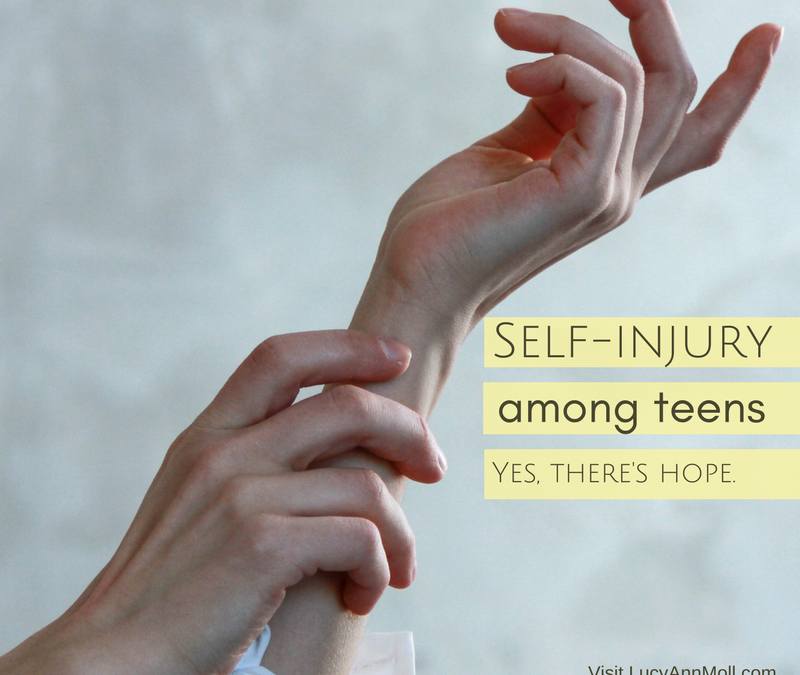Self-Injury among teens (or anyone) doesn’t make sense, right? But for someone who self-harms, the act of cutting or burning (as well as other forms of mutilation) reduces emotional distress. And it has a root cause. This article by Julie Ganschow, who is listed on Heart2Heart Counselor Directory, first appeared here on The Biblical Counseling Coalition website and is used with permission.

Rebekka, 15, wore a hat, long sleeves, and jeans to our first counseling session. Not so unusual for a teen, except it was a hot August afternoon and the temperature outside was 101 degrees.
As I got to know Rebekka, I learned she was sent to see me because she was self-harming. She had no eyelashes or eyebrows, and her hat concealed large bald spots where she had pulled out her hair. I eventually saw the dozens of scars on her arms and up and down the length of her legs, where she had repeatedly cut herself and picked off the scabs. She also bore numerous burn marks from cigarettes and lighters.
Cutting and burning are the most common forms of self-injury among teens who we see in our counseling center.
Why Do Teens Self-Injure?
The teenage years (when self-injurious behaviors commonly begin) can be traumatic times. This can be especially in our culture, where children are presented with decisions and choices they are not mature enough to handle.
Our teens have greater pressures than at any time in history. Click & Tweet! College preparation now begins in eighth grade for many students, as they have to make choices about Advanced Placement classes. Many high school students work 20 or more hours per week to save for college. This is in addition to attending classes and doing AP homework.
At school, teens receive mixed messages about relationships and sexual orientation. Sexual behaviors are taught in graphic detail and promoted in the popular media. Our children are pressured to be sexually active long before they are emotionally and physically ready. They are thrust into many situations they are not ready to deal with! Some deal with the heartache of a broken home, spending alternate weekends with each parent, and the pressure that comes from being in the middle of divorce.
These are only the “normal” stresses and do not cover the extreme cases, such as sexual abuse by a parent or step parent; drug or alcohol use in the home by parents; out-of -control siblings who raise tension in the home; same-sex unions, sexually transmitted diseases or abortion.
Many children and teens come to believe there is little they can count on and nothing that is stable. Who can they talk to besides each other? Who can they really trust? All these factors feed into the world of self-injury among teens, and it becomes their method of dealing with indescribable pain and loneliness.
Like other self-injurers, Rebekka reported that she felt empty inside, stressed, and unable to express her feelings. She struggled to tell me she was lonely, not understood by others and fearful of intimate relationships and adult responsibilities. Self-injury was her way to cope with or relieve painful or hard-to-express feelings.
What Can I Do to Help?
There is no quick fix, no systematic formula to follow in stopping self-injury among teens. I encourage parents to follow biblical principles rather than going the route of psychotherapy and secular counseling. Secular reasoning is contrary to biblical methodology. The self-injurer doesn’t have an illness that can be medically diagnosed. Rather, she has is a faulty coping mechanism that has become a sinful habit.
Whenever possible, I involve the parents in the counseling process. We teach the parents how to disciple their child through this turbulent time in life. God entrusted Mom and Dad to care for their child and I am there to support them in teaching, rebuking, correcting, and training their child in righteousness (2 Timothy 3:16).
The biblical perspective on self-injury among teens is that it is primarily a heart issue (Matthew 15:11; Matthew 15:17-20; Luke 6:43). Like other self-injurers, Rebekka had an overall focus on herself: her pain, loss, feelings, her wants, and her desires.
She learned to examine her heart in light of Scripture (Jeremiah 17:9). The Bible reminds us that permanent change requires a change of heart brought about by a renewal of the mind (Romans 12:2). We had to identify the root cause of her behavior so true healing could take place.
Run to God with the Pain
I encouraged Rebekka to go to God in prayer and lay down the burdens of her heart.
The LORD hears the needy and does not despise his captive people (Psalm 69:33).
Directing Rebekka to the Psalms brought comfort and insight about crying out to God in distress. She was reminded that God cares about her, and the weight of guilt, shame, failure, anger, and rejection she carries. Also she was greatly comforted in realizing the Lord Jesus Christ was intimately acquainted with every sorrow and pain she had.
The Psalmist wrote,
Turn Yourself to me, and have mercy on me, For I am desolate and afflicted. The troubles of my heart have enlarged; Bring me out of my distresses! Look on my affliction and my pain, And forgive all my sins (Psalm 25:16-18, NKJV).
In biblical counseling, Rebekka learned the necessity of repentance. She learned about the sovereignty of God, people pleasing, and how to deal biblically with anger, hurt, and bitterness. As her mind was renewed, she began to understand the role idolatry played in her behaviors. She realized how worshipping her idols only led to guilt, shame, and deception and that, in reality, self-injury didn’t help with her pain after all.
Initially she experienced many failures and would still revert to cutting or burning herself, but Rebekka persevered in righteousness. She was determined to glorify God and worked very hard to stay in the Word, put the behavior off, renew her mind, and put on the new self (Ephesians 4:22-24).
She made life application of what she was learning and denied her fleshly desires. Six months later, she had eyebrows, eyelashes, and the bald spots on her head were covered with hair. The real triumph came when she gave her parents her “treasure box” of razor blades and burning materials. Click & Tweet!
Today, Rebekka is free.
So if the Son sets you free, you are truly free (John 8:36, NLT).
Join the Conversation!
Do you believe the Word of God is enough to address even the “hard cases” in counseling?
Counseling Hearts to Hope,




